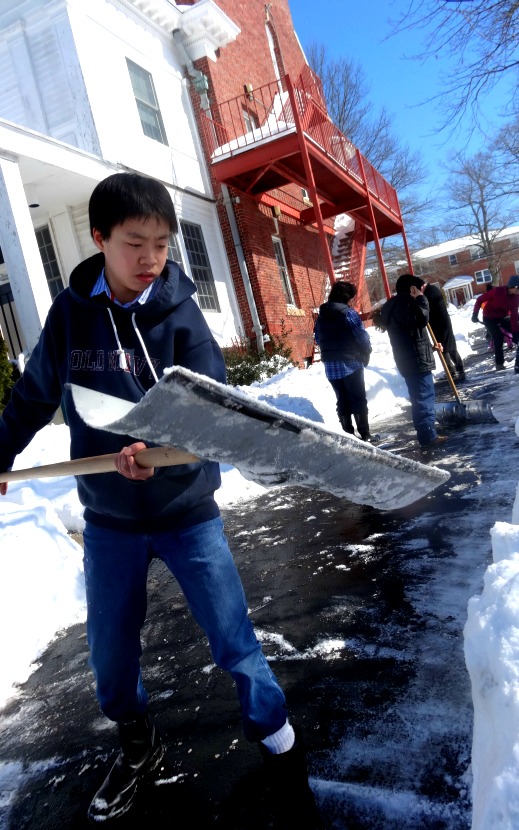Speaking Jewish: 6 Words That Take You Beyond “Oy” And “Vey”

We all use them in our everyday speech, even when we don’t realize it. Words like glitch, kitsch, nosh, shpiel. Yiddish forms a big chunk of our vocab, and it’s what we associate with Jewish oral tradition — but it’s not the only language spoken by Jews from various parts of the world. Our Jewish-American Mash-Up Franny Silverman has compiled a glossary of Jewish words whose origins may surprise you. Don’t worry, she’s kept it kosher.
“You’re having trouble falling asleep? Don’t count sheep. Count Yiddish words that begin with ‘Shhh.’ Trust me. It works every time: ‘Shlep, shnorr, shmutz, shnozz, shtup, shissel, shtick, shpiel, shluff …’”
In the last few months of her life, my Bubbie shared this nugget of wisdom with me. She didn’t speak Yiddish, but her parents did, and so the words trickled down into her vocabulary and into the vernacular of the family she raised, right down into the home I grew up in. (Editor’s Note: What Is Your Bubbe Meise?)
Yiddish is a mash-up of German and Hebrew, and because Jews across Europe spoke Yiddish, it was their common language before English when they moved to America. But it is hardly the only Jewish language. Jews are a people found all over the world whose vernacular is impacted by the languages of their ancient religious texts (Hebrew and Aramaic) as well as the languages of the various regions where they lived.
Other Jewish languages include Ladino, a Spanish/Hebrew mash-up; multiple strands of Judeo-Arabic that vary based on region (Yemen, Morocco, Iran); and the Ethiopian language, Amharic. This means that “Jewspeak” can include words from all of these languages.
I consulted some American Jewfolk with ties or ancestry from Eastern Europe, as well as Morocco, Palestine, Israel, Iran, Turkey and Spain, to offer you six words in “Jewish” that take you beyond “Oy” and “Vey.”
1. Balagan (bah-lah-GAHN): Utter chaos; a wreck.
A balagan can be big or small, personal or universal, short-term or never-ending. Examples of things that can be described as a balagan:
My kitchen sink
Getting out of the house in the morning with a toddler — in winter.
The Republican presidential candidates
Flint, Michigan
According to the Internet, the modern Hebrew word balagan either has its origins in the Polish word, balagan, which also means “a mess” or the Russian word balagan, meaning “a kiosk and/or traveling puppet theater.” Or perhaps those are adaptations of the Persian word balchan.
Things that can be described as a balagan: The Republican presidential candidates.
2. Mensch (mench — like “bench,” but with an “m”): A top dog individual. A really solid, all-around, good person.
Examples of a mensch:
The woman in line in front of you and your toddler at the restaurant bathroom who invites you to go before her — total mensch.
The neighborhood kids who offer to help you dig out your car from under the snow, just because. Menschy to the max.

This definition is straight-up Yiddish from the German word for “human.” Want more on mensch? Check out Tiffany Shlain’s new short called “The Making of a Mensch” which goes deep into identifying and fostering mentshlekhkeyt — the qualities that go into being a mensch.
3. Dayenu (dai-YAY-noo) Literal meaning: “It would have been enough.”
I couldn’t find a solid idiomatic English translation for this exclamatory proclamation of gratitude, which is why it’s such a useful addition to your Jewish lexicon! Basically, dayenu is used as an accent when something already remarkable is made even better.
Examples of when to use it:
“I got a parking space on an alternate side day in under five minutes, AND it’s right in front of my building — DAYENU!”
“My child went to sleep so easily last night AND she slept until 8 a.m. — DAYENU!”
The word is Hebrew and is known across multiple ethnic Jewish communities and comes from a super-catchy Passover song of the same name, which is at least over a thousand years old. Not only is Dayenu an excellent word, it also comes with its own theme song — DAYENU!
4. Khalas (KHAH-lahss): Stop. Enough already. No, seriously, wrap it up. STFU.
This Arabic word was shared with me by a Mizrahi American Jewess. A quick Googling will reveal that khalas is a fave word around the world.
Use it to:
Tell your chatty officemate to shut up when your headphones aren’t getting the message across.
Wish that something would come to an end already: “Khalas! Five years at this place — I really deserve my own office.”
Shut it down once and for all: “From now on — Khalas, I’m working from home.”
***Note: My friend shared this word with me in tandem with the Hebrew word dai which essentially means the same thing. Khalas was the word of choice for her Moroccan father and dai, the word of choice for her Israeli mother. Want more clarification on the word dai? It’s super popular in Israel, definitely related to dayenu, and yes, it’s pronounced “die.” Awkward.
5. Ungepachket (UHN-geh-pach-kit): Gaudy; too overdone or busy or fancy.
This is one of my favorite Yiddish words, as I find the word itself perfectly models that which it’s describing. It has so many letters, too many syllables. Basically, it’s soooo ungepachket! The word has Slavic roots and depending on which region of Europe you’re talking, its pronunciation and English transliteration spellings differ: ongepatchket, ongepachke, ungepachkey, ungepacht.
Examples:
“Earrings, two necklaces, three bangles and a brooch?! So ungepachket! Take one off.” (said my Bubbie with great frequency.)
“Do you think smoky eyes and a red lip are too ungepachket for a Super Bowl party?”
Once ungepachket enters your lexicon, you may never go back.
Once ungepachket enters your lexicon, you may never go back.
6. Habibi (ha-BEE-bee): Sweetie. Darling. Boo. Buddy. Bestie. Lover.
Habibi is an Arabic word that has been in the vernacular of the Arabic-speaking world for a long time. Just as Yiddishisms like mensch have seeped into English, so too has habibi seeped into Hebrew and the vernacular of some American Jews.
Habibi is the ultimate term of endearment. Depending on the context, habibi can sub in for any number of words in English.
Try habibi instead of:
bro
friend
honey
I should add that both Arabic and Hebrew are gendered languages, but in my experience hearing it used, habibi is applied across genders. However, if you’re among Arabic speakers, habibi is technically the male version of the word, while habibti is the female version. But look, habibi, whatever you say is good.
Mazel tov, you too can now “speak Jewish” like a pro. Let’s use these words together!
Habibi, can you believe the balagan with this snow? And of course I can’t find a matching hat and scarf and gloves. Have you ever seen someone so ungepachket? Khalas, I’m over it and it’s only February! I’ll stop kvetching. But you know, those sweet kids helped shovel the whole block — such mensches! It would have been one thing for the super to do it, but the kids, too! Dayenu!
We love talking language. Check out these other Mash-Up guides:
Erin McKean On English, Our Shared National Delusion





